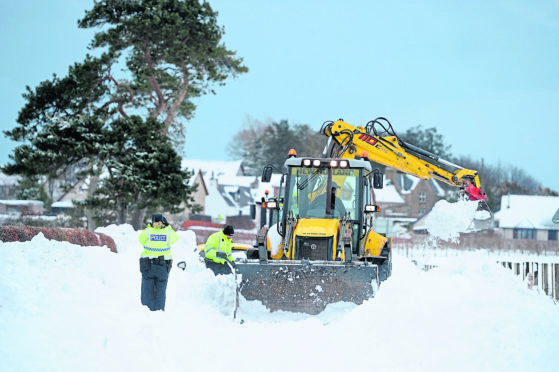Highland Council will rely on local community groups to grit residential roads this winter – despite no-one taking part in the same scheme last year.
The council faced criticism last winter after icy roads and pavements in residential areas were left untreated. Council leader Margaret Davidson gave assurances that “any necessary changes” to the winter maintenance policy would be made, dependant on budget.
The environment, development and infrastructure committee has since ruled that no changes will be made to its prioritisation of roads in the Highlands and Islands, with residential areas remaining as the lowest priority. In Inverness, this accounts for 44% of roads.
Councillor for Caol and Mallaig, Allan Henderson, who chairs the infrastructure committee, said: “We’ve listened to the people of the Highlands and Islands and the demand is in the areas where people live. But we have a limited number of vehicles and a limited amount of personnel. We can’t just magic up extra people. We would love to do every area at the same time, but this is the best we can do with the money and equipment that is available to us.”
>> Keep up to date with the latest news with The P&J newsletter
Mr Henderson added: “There has to be a bit of understanding that it’s not possible to do everything. We have to make very difficult choices with the allocated money.”
Communities concerned about untreated roads and pavements can enrol in the Highland Council’s Winter Resilience scheme and apply for supplies of grit, snow scrapers, and high-vis jackets. Applications can only be made by community councils, not individuals. Mr Henderson said that, to his knowledge, not a single community council enrolled in the scheme last winter.
The council says this year’s winter strategy will be more adaptable to changes in the weather, with freezing conditions triggering mobilisation of community services staff to assist in the treatment of pavements.
Local contractors can also be brought in at short notice should deep snow need to be cleared.
On of the most common complaint last winter was that some elderly and infirm people were effectively housebound due to icy pavements.
Mr Henderson said: “What would be the point of someone going out to the shops if we couldn’t get supplies to the shops? We have to stick with the prioritisation of routes. It doesn’t matter how nonsensical it looks. I would say that if an elderly person has to go out then surely community spirit should kick in there?
“If they’re really desperate that they have to go out then we would advocate that they have a pair of winter grippers on their feet. You have to apply a wee bit of common sense to both parties. I’m an older person. I understand it. I don’t want to be slipping either.”
Aviemore Community Council chair John Grierson said the Winter Resilience scheme had not been adequately publicised, and he wasn’t aware that community councils had to apply.
Mr Grierson said: “If it’s up to the community council to organise it then it would have been nice for Highland Council to come and ask us. I feel it’s their responsibility.
“This year they’ve cut the funding for community councils by half, yet they expect us to do everything for them.”
One of the areas most affected by weather last winter was the Seaboard Villages near Tain, where roads were buried under several feet of snow.
Alice Smith runs the Seaboard Cares charity, which puts on social events for elderly people, and runs playgroups for children. She said: “When the snow hit last year, carers couldn’t come to the village due to lack of transport. We put out a call for people with four-wheel drive vehicles and we got an excellent response. Everybody mucked in and helped.
“The council were doing their best. I wouldn’t criticise them in any way because it’s an impossible job.”
Highland Council has revealed that this year’s winter strategy will be more adaptable to changes in the weather, with freezing conditions triggering mobilisation of community services staff to assist in the treatment of pavements.
Local contractors can also be brought in at short notice should deep snow need to be cleared.
One of the areas most affected by weather last winter was the Seaboard Villages near Tain, where roads were buried under several feet of snow.
Alice Smith runs the Seaboard Cares charity, which puts on social events for elderly people, and runs playgroups for children. She said: “When the snow hit last year, carers couldn’t come to the village due to lack of transport. We put out a call for people with four-wheel drive vehicles and we got an excellent response. Everybody mucked in and helped.
“The council were doing their best. I wouldn’t criticise them in any way because it’s an impossible job.”
